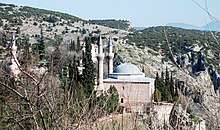Sheikh Edebali
Sheikh Edebali (b. Karaman, 1206 — d. Bilecik, 1326), also referred as Balışeyh, was a highly influential Turkish Sunni Sheikh of the Ahi brotherhood, who helped shape and develop the policies of the growing Ottoman State.[1] A descendant of the ancient Arab Banu Tamim[2] tribe he commanded great respect in the religious circles.

Interaction with Ottoman leaders
Edebali often conversed with his close friend Ertugrul Ghazi, the father of Osman Ghazi, about Islam and the state of affairs of Muslims in Anatolia. Osman had been a frequent guest of Edebali. Edebali became Osman's mentor and eventually girt him with a ghazi sword.[3] In an often mentioned account, Osman, while at Edebali's dergah, dreamed of the crescent moon coming out of Edebali's chest and entering his own.[4] This dream was to lead to the establishment of the Ottoman State. Edebali's daughter Rabia Bala was married to Osman I in 1289. Sheikh Edebali died in his 120th year in 1326.
Advice to Osman Ghazi
Edebali's advice to his son in law, Osman Ghazi, shaped and developed Ottoman administration and rule for six centuries.
In one famous declaration, Edebali told Osman:
O my son!
Now you are king!
From now on, wrath is for us;
for you, calmness!
For us to be offended;
for you to please!
For us to accuse;
for you to endure!
For us, helplessness and error;
for you, tolerance!
For us, quarrel;
for you, justice!
For us, envy, rumor, slander;
for you, forgiveness!
O my son!
From now on, it is for us to divide;
for you to unite!
For us, sloth;
for you, warning and encouragement!
O my son!
Be patient, a flower does not bloom before its time.
Never forget: Let man flourish, and the state will also flourish!
O my son!
Your burden is heavy, your task hard, your power hangs on a hair!
May God be your helper!
See also
- Foundation of Ottoman Empire
External links
| Wikimedia Commons has media related to Sheikh Edebali. |
References
- The Ottoman Empire, by Halil Inalcik, p. 55.
- Elizabeth, Stone (1871). History of the Ottoman Empire in Europe for Junior Classes. Princeton University - W. Collins, 1877.
- The Last Great Muslim Empires, by H. J. Kissling, Bertold Spuler, N. Barbour, F. R. C. Bagley, J. S. Trimingham, H. Braun, H. Hartel, p. 2.
- The Origins of the Ottoman Empire, by Mehmet Fuat Köprülü, Gary Leiser, p. 6.